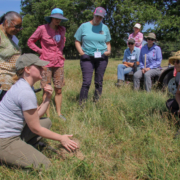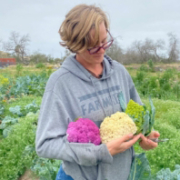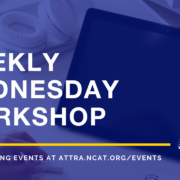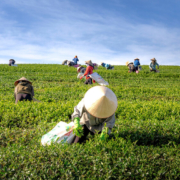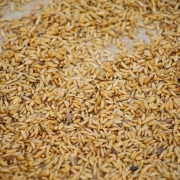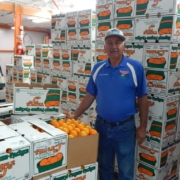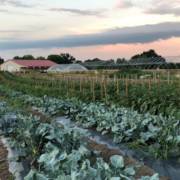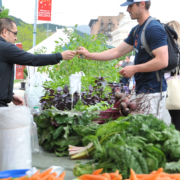Find Your Community at Pasture Walks
 Print This Post
Print This Post
By Linda Coffey, NCAT Agriculture Specialist
You know how in the olden days neighbors would pitch in to do the big jobs and be there to support each other when something went wrong? That still can happen if we get to know our neighbors and take time to grow a community. Pasture walks are a perfect way to build that community. You know you’ll have something in common with the other people who attend: folks at pasture walks usually share the desire to learn how to steward their land and livestock profitably. It’s a supportive environment, where people understand that everyone benefits when everyone succeeds because successful stewardship helps our watershed, our economy, and our community. When agriculture is strong in our area, that helps all the related businesses, from the Farmer’s Cooperative to the processing plant, and it makes our local food system safer and stronger.
But apart from those societal benefits, pasture walks are just fun! I enjoy being around like-minded, positive people. I’m bound to see old friends, and I sure hope to meet new people, too. Folks encourage and help those just getting started or introduce a beginner to the mentors of the group. It’s satisfying to make those connections. The conversations and discussions are always rich, and you can’t predict what will come up.
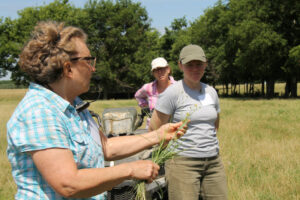
Claire Whiteside, NRCS, identifies a grass for farmers. Photo: NCAT
At pasture walks, you always get to hear from the host farmer, but you also get to walk out on the land, hear the birds and insects, see the gleaming coats of the cattle and goats and the energetic look of the sheep. Being there physically is so much better than just watching a video or PowerPoint. And it’s so great to be able to ask someone, “What is that plant?” or “What was that bird?” and tap into local knowledge. I’m inspired at the pasture diversity some of our neighbors have, and I want to know how to get as many birds on our farm as they have on theirs. It’s great to be able to pick their brains and see for myself what they are doing, and ask “Why?”
If you need to find a local grazing network to see what pasture walks are happening in your region, your state grazing lands coalition, local NRCS office, or Cooperative Extension might be able to point you in the right direction. They often help coordinate these events.
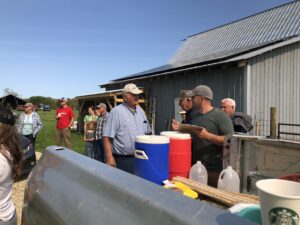
Farmers mingle and get refreshments before the pasture walk begins. A truck makes a fine table. Photo: NCAT
You can also host one sometime! You don’t have to have everything “perfect” (there’s no such thing!) or be an “expert” grazier. Hosting a pasture walk is a great way to get input from other farmers, to ask questions of people with different perspectives and experience who can toss ideas around. Basically, you provide the space, figure out where you could have 15 to 20 cars and trucks parked, have some folding tables for a potluck lunch or dinner, and you’ve got what it takes to host a pasture walk. I have hosted walks at my farm, and it was a lot of fun. I worried a bit about whether the place looked good enough but I was told, “It’s the real world, and that’s what we want to see, not a showplace!” That took the pressure off. It was satisfying to be the host and share what has worked for us. It’s a way to pay back for all the help we’ve gotten from others.
Another way to interact with others who care about the land and livestock we steward is to join the Soil for Water network and participate in the forum. Plant a flag on the Soil for Water Atlas and look to see if you have neighbors on there already. If not, can you encourage them to be listed? I have a personal goal of having as many from Arkansas as from Texas, but that’s just sibling rivalry. It’s really great to find someone in your area, though, and that’s only possible if you post! The site also features an events page, where you can find national and regional events. But it’s the local ones that have me most excited!! I do hope you can come to the next one.
Related ATTRA Resources:
Regenerative Grazing
Paddock Design, Fencing, Water Systems, and Livestock Movement Strategies for Multi-Paddock Grazing
Managed Grazing Tutorial
Grazing Networks for Livestock Producers
Advanced Grazing, Session 4 – Adaptive Management
Episode 268. Managing Land, Cattle, and Quality of Life: Dr. Tina Cone, DVM
Episode 264. Holistic Animal Health with Dr. Ann Wells, DVM
Other Resources:
National Grazing Lands Coalition: State Coalitions
Cooperative Extension
NRCS State Offices
On Pasture
This blog is produced by the National Center for Appropriate Technology through the ATTRA Sustainable Agriculture program, under a cooperative agreement with USDA Rural Development. ATTRA.NCAT.ORG.

